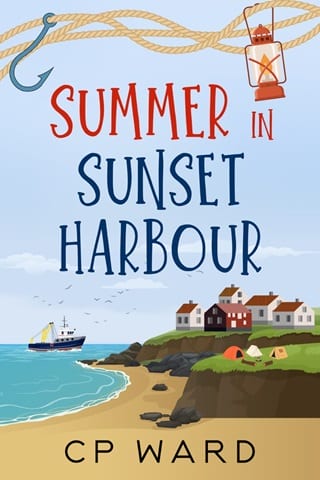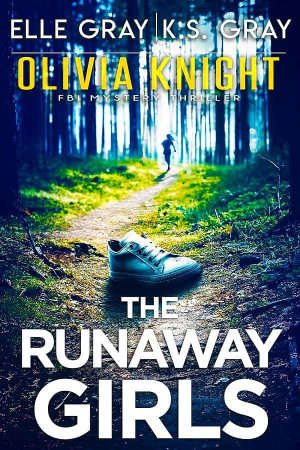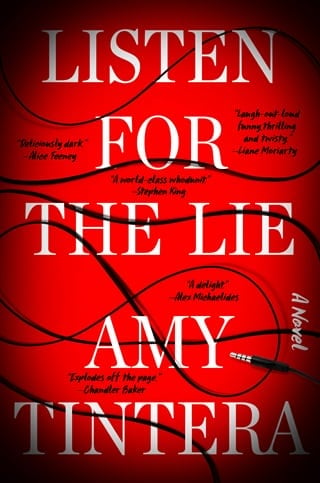9. Clearing out the Attic
9
Clearing out the Attic
‘I know you can hear me up there,’ Josie shouted, hands cupped around her mouth. ‘I’m willing to be reasonable about this, but you can’t stay up there, and you certainly can’t cause me any trouble. I appreciate that some people like frogs, but I don’t. One more trick like that and I’m calling the police.’
She waited, staring up at the undersides of the treehouses. Safe enough for children, they were only ten feet off the ground, and with a stepladder she could have climbed up, but rather than confront these people directly, she wanted to reason with them first. And in any case, what if they were dangerous? She felt it unlikely; putting a frog in her shopping was hardly an act of mass sabotage, but even so, it showed enough intent that she had to tread lightly.
‘By the way,’ she called up, lowering her voice a little. ‘Can you please pick up your pasty wrappers? Although I applaud your choice. I had a Suncrust for lunch. Best pasty I’ve had in years.’
She thought she heard a murmur from inside one of the treehouses. A wooden board creaked, but even though she waited for a couple of minutes, no further response came. With a sigh, Josie turned and trudged back through the forest to her cabin.
It was best to keep busy. It would take her mind off things—and really, if a bunch of tree-living, grass clothing-wearing hippies thought they were the biggest problem she had, they should consider a costly divorce and a daughter dropping out of medical school—and a bit of exercise was always good for a troubled mind. She tried to remember who had told her that: it was probably Hilda. Her friend had as many motivational sayings as she did botany awards.
Josie guessed it was best to start at the top and work her way down. Taking the strimmer and a couple of scythes also on loan from Hilda, she hacked away the undergrowth around the entrance, then started pulling down the vines from the camp reception and shop. As she worked, she made a mental note of what she would need—and find some way to fund; although she felt confident she could lean on Hilda for a loan if necessary—and what would require specialist skills to repair.
While she could pull down vines, cut away vegetation, hold a paintbrush and change a few lightbulbs, she couldn’t repair frayed wiring or replace a broken window pane, fix a buckled roof or seal a split gas canister pipe. At some point she would have to call for outside help, but the harder she worked, the harder she wanted to work. The hours rushed past, and when she heard the rumble of Hilda’s gardening van bumping down the path, she glanced at her watch and was surprised to see it was nearly seven o’clock. She had been working since before lunch with little more than a break to sip some water.
‘Huh, I never knew that was there,’ Hilda said, pointing at the uncovered reception building as she climbed out of her truck. ‘It looks like you’re doing a great job. I just thought I’d pop down and see how you were getting on.’
Josie smiled. ‘It’s a work in progress,’ she said. ‘But it’s getting there.’
‘Are you ready to break for some dinner?’ Hilda grinned. ‘It’s curry and a pint night at the pub.’
Josie frowned. ‘Neither of which I thought would interest you….’
Hilda shrugged. ‘Things have changed. Don’t worry, we’ll drive down, get a taxi back up. Just in case you’re a bit worse for wear, you can stop over at mine tonight.’
‘But a queen needs to be at her palace.’
‘Not when it’s curry and a pint night. Come on, grab something decent to wear and I’ll take you over to my place for a rinse down. I think you have a bird’s nest in your hair.’
Josie scrabbled at her head, but came away only with a couple of leaves. She glared at Hilda, who shrugged and gave a little smirk.
‘I guess my eyes aren’t what they used to be.’
The Horse and Buoy Inn, Porth Melynos’s premier pub, was set just back from the harbour, a dramatic and beautiful stonewalled building with pleasant landscaped gardens to the side and rear. Even though late April was still a little chilly, several tables were occupied outside. Josie caught a couple of upcountry accents mixed with the gravelly ones of locals. A couple of kids played on a climbing frame at the bottom of the garden, while the smell of curry wafted out of the pub’s kitchen windows.
‘Not sure my ulcers will handle a phaal, so we’ll likely go for a mid-to-high heat tikka,’ Hilda said, rubbing her hands together as they walked up the path.
‘You have ulcers?’
‘Who doesn’t at my age? What are you thinking of having?’
‘Oh, just something mild. A korma will do.’
‘Don’t you want something to put some fire into your belly? You were saying about those strange people. Did you have a word with Nat?’
‘I went up there but I forgot. I have to admit, I’m a little nervous about them being there.’
They pushed in through the doors and took a table by the wall. About half the tables were occupied, the food a mixture of curries and old-fashioned pub staples. A few people sat by the bar, chatting amicably over beer and wine. A fire flickered in a grate, paintings of the harbour and cliffs hung from the stone walls, and photographs of old local sports teams hung above the bar. A shelf of books stood in a corner, a stack of board games and magazines in another. Beside the fireplace was a sculpture made out of driftwood and fishing nets. At first Josie had no idea what it was supposed to be, before squinting a little and realising it was a representation of a mermaid sitting on rocks. Even once she had seen it, however, she couldn’t be entirely sure.
‘Is that one of Nathaniel’s?’ she asked Hilda as her friend scoured a laminated menu.
‘Oh, yes. I think so. It’s been there a while. I think he’s better now that he’s blind, though.’ She raised a hand in the air, then suddenly let out a gasp of surprise.
‘Cathy? Is that you?’
A big, boisterous woman wearing a white blouse over black trousers, with an apron adorned with a seashells pattern tied around her waist came blustering over. A shoulder-length bob of hair bounced up and down as she clapped her hands together hard enough to make half the conversation in the pub stop.
‘Hil? Oh my word, Hil? Is that you?’
‘Cathy!’
Hilda stood up to greet the other woman, who dwarfed her both in height and width. Cathy leant in and gave Hilda a surprisingly delicate kiss on the cheek, before clapping her hands together again. The gentle background music, which had seemed to pause, now seemed to rise again as people on the surrounding tables resumed their conversations.
‘Oh my, Hil, I thought for a minute I’d been struck by a speeding pasty van when I saw you just then,’ the big woman said. ‘What brings you down here?’
‘Just a night out with my best friend,’ Hilda said, indicating Josie, who gave Cathy a shy smile. ‘Cathy Ubbers, this is Josephine Roberts.’
‘Nice to meet you,’ Josie said, sticking out a hand which was immediately swallowed up by a huge and podgy, but surprisingly powerful, paw. Cathy gave her hand a tug hard enough to make Josie’s shoulder ache, then let out a dramatic sigh.
‘It’s Cathy Ubbers-Benson these days. ‘Me and Gav got hitched. I so wished you could have been there.’
‘I was in Antarctica.’
Cathy let out a guffaw and gave Hilda a playful punch on the arm. ‘Oh, you. Any excuse.’ She turned to Josie. ‘What brought you down here, Jose? On hols?’
‘Divorce,’ Josie said.
Cathy let out a hysterical laugh. ‘Oh my, I can see why you two are friends. Anyway, I’d better get back to the kitchen, lol. Them curries ain’t gonna cook themselves.’
‘Do you work here now?’ Hilda asked.
‘Volunteer,’ Cathy said. ‘Gav’s now a stay-at-home dad for the little three.’ She leant down as though to whisper something, but her voice was loud enough for half the pub to hear. ‘Number four’s in the oven. He thought it would be nice for me to get out and about while I have the chance.’
She laughed again, slapping the table hard enough to make a basket of condiments rattle, then marched off without another word.
‘She’s … nice,’ Josie said.
‘Larger than life in more ways than one. One of the local characters, everyone’s best friend. I’ve only met her a handful of times. She won the lottery a couple of years back, so now owns the local launderette, as well as one of the bakeries. She puts her golden stamp on everything.’ Hilda chuckled. ‘What used to be the Porth Melynos Tea House is now Cathy’s Cakes and Buns.’
‘I’ll be sure to stop by while I’m here.’
‘Great for diabetes,’ Hilda said, then tapped the tabletop with far more finesse than Cathy had. ‘Right, let’s order. My stomach is starting to grumble.’
An hour later, filled with curry and a couple of pints of beer each, Josie felt ready to turn in. Hilda, though, defying her years, ordered a bottle of wine.
‘I just want to have a proper toast to you being here,’ Hilda said. ‘Every cloud has a silver lining, and your divorce was definitely mine. I could never get up to Bristol to see you as much as I wanted, what with work and everything, and while this certainly isn’t the ideal situation, I think it’s great that we can spend some time together.’
‘I appreciate having a friend,’ Josie said, suddenly feeling a little tearful. ‘After everything that’s happened, I really needed it. Most people we knew took Reid’s side by default, as though the sensitive singer-songwriter couldn’t possibly be to blame for anything. My friends turned against me, and even Tiffany—’
She clamped her mouth shut, but it was too late, the alcohol had done its work.
‘What about Tiffany? She’s still on your side, isn’t she? Has she decided where she would like to do her residency?’
Josie felt like the world—or at least one of Cathy Ubbers’ hands—was pressing down on her shoulders. She slumped in the chair and sighed.
‘She told me she’s dropping out. She doesn’t want to pursue medicine anymore. After all these years of studying—after all the money I spent to support her—all that work, and she’d decided it’s not what she wants.’
‘Oh dear. Well, perhaps she’ll do something similar, you know, paramedic or something like that—’
Josie could barely bring herself to speak. ‘She’s decided to be Reid’s tour manager,’ she said. ‘She’s turned her back on everything she’s worked for to help her father.’ She gave a sad chuckle and wiped away a tear. ‘I suppose that’s something, isn’t it? She’s loyal to her family. Half of it, at least. Whether he’s deserving of that loyalty, I don’t know. He was hardly ever there when she was a little girl. Never did sports practices, and the one time he came to parents’ evening, he tried to slip her form teacher a CD with his mobile number written on the inside. Oh, he brushed that off, told me it was a spare copy he’d made for a radio station. God, what a fool I was. And now … look at me.’
She realised she was crying. She looked up at Hilda, her vision a blur.
‘Oh, Josie—’
‘I built a house and it fell down,’ Josie sobbed. ‘Every last brick. I worked, and I built, and I saved, and I … I … held it all, held it all together, even as all the pieces started to float apart. I held on. Then it blew up in my face, and I ended up with nothing. Is that how life’s supposed to be, Hilda? Is it?’
Hilda reached out and patted her on the back of the hand. ‘If you’re on the ground,’ she said, ‘You have to try to get to a knee. Because if you can get to one knee, you can get to the other knee, and if you can get up to your knees, you can stand. You need to stand, Josie.’
‘I’m standing,’ Josie said. ‘But sometimes I don’t want to stand. I really just want to lie down and close my eyes.’
‘And when you open them again, things will have got that little bit better,’ Hilda said. ‘Because that’s the way things work.’
Josie smiled. ‘Thank you,’ she said.
They fell silent for a few minutes, listening to the gentle background music. The pub had emptied out now that the restaurant had closed. A few people still sat along the bar, leaning into their drinks. Josie listened to the song playing in the background—some old hit, the name of which she couldn’t remember—and thought that if Reid’s song came on, she would probably scream.
‘Nine o’clock,’ Hilda said quietly.
‘What? It’s later than that, isn’t it?’
‘I’m talking about tomorrow. Nine o’clock start? I can do eight if you really want.’
‘What do you mean?’
‘I’m going to help you with the campsite. See if we can’t get it fixed up.’
‘It’s too much for you, all that work.’
Hilda smiled. ‘I’m not dead yet.’
 Fullepub
Fullepub 



